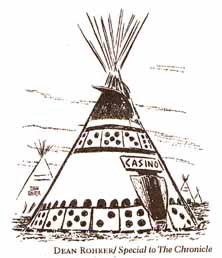-–Anthony R. Pico
A constant, consistent message through the media over the past 20 years could have accomplished a great deal in creating an accurate public image of American Indians. It did not require much money, certainly not as much as the $80 million paid to Abramoff.
Instead of engaging the media, tribes and tribal associations have for the most part remained aloof, ignoring press inquiries and, in too many cases, going to war with the media. The investment in media relations was nowhere near what was paid to lawyers, lobbyists and high priced public relations firms that simply alienated the press.
Instead of being proactive, creating a strong, accurate image of American Indians, tribes have been reactive, scurrying to respond to negative publicity, damaging court decisions and Congressional actions.
Instead of developing an image of Native America for the next seven generations and beyond, tribes have been looking ahead to next week, or reacting to yesterday’s federal court ruling. It’s been a recipe for failure.
In other words, I couldn't agree with Pico and Palermo more. Tribes need to engage in public relations--to get their message out in a variety of forms. Editorials and advertisements, videos and websites, TV shows and movies, cultural exhibits and museums...whatever it takes. They should spend less on lobbyists and more on public opinion.
A few tribes and tribal organizations have "rapid response teams" or the equivalent. When they're unfairly criticized or stereotyped, they respond quickly with rebuttals. They do what smart politicians do during campaigns--namely, attack negative claims before these claims settle in and become the conventional wisdom. That's what Obama did with his website devoted to knocking down rumors and misinformation.
I know Dave Palermo from my work in Indian gaming. He occasionally reads Newspaper Rock. I think he likes the kind of responses I post here and believes tribes should be doing something similar. Don't just accept or ignore the racism and stereotyping; fight them.
For more on the subject, see the Stereotype of the Month contest.
Below: This drawing encapsulates what many Americans think about Indians. Namely, that Indians went straight from being savages living in teepees to greedy casino owners.


2 comments:
There is some PR going already. I listen to the radio a lot, and I hear dozens of advertisements for the local Native-run casinos every day.
On the other side, the area public TV station is out of Central Michigan University. This is the college with the team named "Chippewas". I've mentioned them before as a university that has handled the mascot/team name issue in a most exemplary fashion. Their PBS affiliated station often shows PSA's (or whatever public TV calls commercials) describing the Obibwe "grandfather principles" and other aspects of the nearby Chippewa tribe.
Advertising for Indian casinos isn't the kind of publicity we're talking about. It doesn't counteract the stereotype of Indians as rich casino owners. Nor does it tell us much about the tribes' history or culture.
Post a Comment